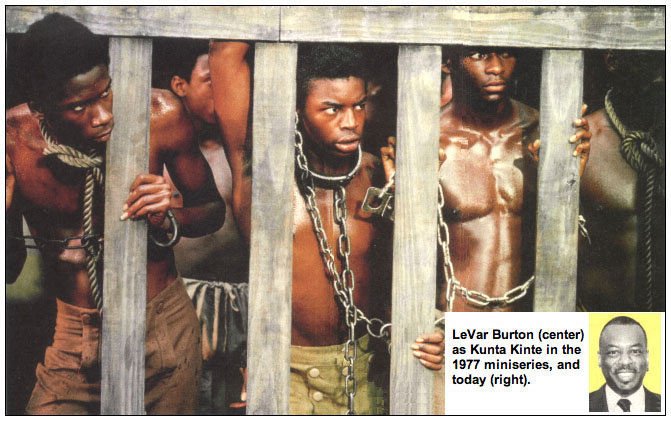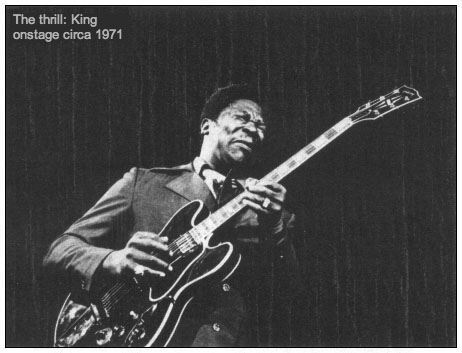![]()
| LeVar Burton Gets Back to His 'Roots' |
|
![]()
The star of the legendary 1977 miniseries discusses
his plans to participate in a 2016 remake.
By Stephanie Schomer in Entertainment Weekly

![]() ctor/director LeVar Burton has signed on to coexec-produce A+E Networks' 2016 remake of Roots, the historic 1977 miniseries that starred Burton as Kunta Kinte, a young West African sold into American slavery. He'll work alongside executive producers Will Packer (Think Like a Man) and Mark Wolper, whose father produced the original. Here, Burton chats about the impact of Roots and getting America to talk about race.
ctor/director LeVar Burton has signed on to coexec-produce A+E Networks' 2016 remake of Roots, the historic 1977 miniseries that starred Burton as Kunta Kinte, a young West African sold into American slavery. He'll work alongside executive producers Will Packer (Think Like a Man) and Mark Wolper, whose father produced the original. Here, Burton chats about the impact of Roots and getting America to talk about race.
You were a teenager when you filmed Roots. Did you ever anticipate its influence?
I did not have any ability of prognostication. [Laughs] No one did! Roots was broadcast on eight consecutive nights because ABC executives were unsure how it would be received. [Producer] Stan Margulies said, "Hey, we're in a country where 80 percent of the population is white and 20 percent is black. How is a multinight miniseries going to play where the whites are the villains and the blacks are the heroes?"
But it certainly played well.
The final episode is still one of the most watched episodes on television in the history of the medium [with 88 million viewers]. This new telling will air simultaneously on [A&E, History, and Lifetime], each with its own specific demographic audience.
When did the idea of a remake first come into play?
I heard about it a couple of years ago, oddly enough at a screening of 12 Years a Slave. Russell Simmons said, "You know they're remaking Roots?" And I said something along the lines of "Why?!" The next day I got a call from Mark Wolper, who explained that he tried to show Roots to his teenage children, who had no interest. They consider it dated. There are generations of Americans who don't know the story. So I wanted to make sure that I could go to my grave knowing we made this telling as good as it can be.
Will it differ from the original?
There is new scholarship that has been done in the interim years. We now know that the village of Juffure was actually a city, and that Kunta Kinte possibly spoke three, four languages -- among them a smattering of English. So Kunta's original story will have a different flavor.
And how do you go about attracting that younger generation of Americans?
I'll be part of a large effort of outreach to schools, community organizations, churches. It's obviously time for America to engage in a conversation about race. And for those who feel that we've been there, done that, bought the soundtrack and T-shirt, I would ask: Open your minds and open your hearts. It is clear we have some work to do in this nation. But it starts with a dialogue.
The current social and political climate has no doubt become quite the driving force.
It's been a force of reaffirmation that this is indeed the right time. We can't get this to the screen fast enough. ![]()
| B.B. King's Boldest Moments |
|
![]()
The man whose name is synonymous with the blues may
be gone, but the indelible music he made lives on.
By Kevin O'Donnell in Entertainment Weekly

![]() here's a reason he was called the King of the Blues. For more than seven decades, the pioneering musician, who died at 89 on May 14 in Las Vegas due to type 2 diabetes, performed hundreds of shows a year -- even well into his 80s. And he did it with little more than a swinging band, his endlessly expressive voice, and of course his trusted ax, Lucille. A look back at King's legacy with five of his greatest songs and performances.
here's a reason he was called the King of the Blues. For more than seven decades, the pioneering musician, who died at 89 on May 14 in Las Vegas due to type 2 diabetes, performed hundreds of shows a year -- even well into his 80s. And he did it with little more than a swinging band, his endlessly expressive voice, and of course his trusted ax, Lucille. A look back at King's legacy with five of his greatest songs and performances.
1. "THE THRILL IS GONE" - 1993
King's version of the song written by Roy Hawkins and Rick Darnell in the '50s is the one that endures. (It also won him a Grammy in 1970.) In this standout performance captured in the film Live at Montreux, the master works up a sweat singing the tune's soul-bearing lyrics while showing masterful restraint with his deft melodic guitar licks.
2. "ROCK ME BABY," LIVE AT CROSSROADS GUITAR FESTIVAL" - 2004
At Eric Clapton's guitar summit, King joined a murderer's row of six-string legends -- Clapton, Buddy Guy, and Jimmie Vaughan -- for a smoking rendition of his first Top 40 hit. He may have been the oldest on stage, but with his youthful energy, he showed the other guys who was boss.
3. "HOW BLUE CAN YOU GET," LIVE AT SING SING PRISON - 1972
King, along with singer-songwriter Joan Baez, played for inmates at the infamous New York State penitentiary on Thanksgiving that year. King didn't need to say anything to make the prisoners feel better about life inside -- he just did it with this raucous rendition of the blues standard.
4. B.B. KING AND FRIENDS, LIVE IN L.A. - 1987
It was a testament to his status as a living legend that the likes of Clapton, Gladys Knight, Phil Collins, Etta James, Chaka Khan, and Stevie Ray Vaughan turned out for this electric show. A stone classic.
5. LIVE IN AFRICA - 1974
King traveled to Kinshasa, Zaire, for a three-day concert pegged to Muhammad Ali and George Foreman's historic Rumble in the Jungle. But it was King's eight-song set that landed the real TKO.
REMEMBERING B.B.
By Billy Gibbons in Rolling Stone
![]()
 ur name is a nod to B.B. King: Originally, we were thinking of naming ourselves ZZ King. Then we figured that was too close to his name -- but B.B. is at the top, so that's what it was: ZZ Top.
ur name is a nod to B.B. King: Originally, we were thinking of naming ourselves ZZ King. Then we figured that was too close to his name -- but B.B. is at the top, so that's what it was: ZZ Top.
B.B. drove a very tight ship with his band -- it was all pro, man. They ran the straight and narrow -- they had a dress code, they had a conduct code, they had a shared understanding: "Don't show up drunk. What you do after hours is your business, but we're going to be on the bus by 8:00 in the morning, and be there." Imagine the challenges of traveling from town to town as an entertainer in the Fifties. You had to stay on your toes.
 B.B. was soft-spoken, but meaningful -- he didn't mince words. I wouldn't say he had a quick temper, but he would be very quick to put somebody in their place if he thought something was out of line. That applied not only to his bandmates but anybody in the room.
B.B. was soft-spoken, but meaningful -- he didn't mince words. I wouldn't say he had a quick temper, but he would be very quick to put somebody in their place if he thought something was out of line. That applied not only to his bandmates but anybody in the room.
When you think about it there are only a handful of great live albums -- James Brown's Live at the Apollo and B.B.'s Live at the Regal. He was underrated as an arranger. He knew which songs to put a horn section behind, and he knew which songs demanded a keyboard part. You may have noticed that B.B. didn't play much while he was singing. So one time I asked him, "Is there a reason that you don't play and sing at the same time?" And he said, "They're both special!" His talent was a gift, and he didn't waste it.
He once said, "Learn to play what you like to hear." I've used that line over and over again. ![]()
![]() Reader's Comments
Reader's Comments
No comments so far, be the first to comment.
